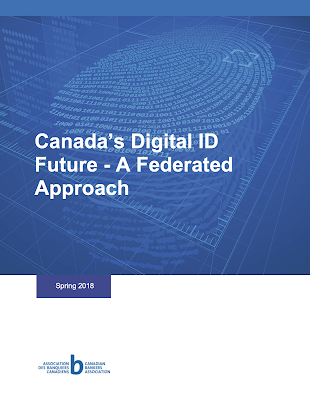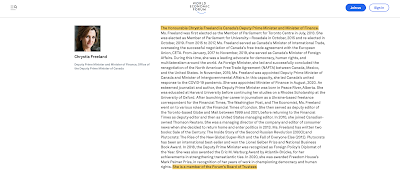As some Canadians found out the hard way, the Canadian government, the police state and the nation's banking system are quite capable of conspiring to help prevent the sweaty masses from accessing their bank accounts and other bank services. While the Canadian government has retracted, at least temporarily, the immediate use of their powers to suspend an individual's banking "privileges", they have set a standard for the future and, as you will see in this posting, is not going to be one that is particularly palatable to those of us who wish to retain both our privacy and access to the funds that we have managed to save.
Here are some fascinating comments released in 2018 video from Neil Parmenter, the then President and CEO of the Canadian Bankers Association or CBA who stepped down from his role on December 23, 2021 with my bolds throughout:
"Canada is on the cusp of a revolutionary innovation that will transform the way Canadians authenticate themselves online and protect their identity - Digital ID. All of us are living in a digital world, but we're tethered to an analogue model of how we identify ourselves: memorizing countless online passwords, carrying government issued licences, plastic cards and more. Digital ID is a way for Canadians to identify themselves to government, businesses and to each other electronically, with ease and rock-solid security, without the need to present physical documents. One interconnected network. A federated digital ID ecosystem - developed in collaboration with Canada's best and brightest talent from our banks, telecommunications companies, law enforcement and government. It would have the power and security to store every Canadian's electronic identity and attributes. And, it would unlock countless opportunities for Canadians to verify who they are safely, quickly and securely, while only revealing the information necessary for each transaction. A fast and secure way to bank, signup for government services, renew driver's licences or health cards, shop, travel and more. Canada's banks are perfectly situated to help lead the creation of a federated digital ID system between government and the private sector.
And now, for the most frightening/interesting part of the video:
"The World Economic Forum agrees that banks and financial institutions should lead the path forward for digital ID."
Isn't it fascinating to see how the ruling class at the World Economic Forum manages to worm its way into every aspect of our lives?
And now, back to the somewhat less frightening part of the video:
"Banks are highly regulated and trusted. They have advanced cybersecurity and privacy technology and they have the infrastructure to operate provincially and nationally. Banks are also at the forefront of working with fintech start-ups who are bringing revolutionary mobile and online products and services to Canadians. Digital ID can help consumers navigate between these apps and programs with trust and confidence, knowing their ID is protected at all times. A federated digital ID approach can also significantly reduce fraud, save taxpayer money, improve regulatory compliance and make it easier to do business as an owner and as a consumer. In fact, the Canadian Bankers Association just launched a white paper with our recommendations on how to move forward with a federated digital ID framework. I encourage you to read it to learn more."
Here is a link to the video in its entirety:
Here is the cover of the CBA's white paper on Canada's digital ID:
The CBA claims that Canadian stakeholders stand to gain from an effective digital ID system in the following ways:
1.) cost savings.
2.) fraud reduction.
3.) improved regulatory compliance.
4.) privacy enhancing.
5.) future ready.
Let's look at what the white paper says about how privacy will be enhanced by the issuance of a national digital ID:
"Privacy and security of personal identification is a growing concern. A digital ID system enhances privacy and puts greater control of identity back into the hands of the consumer. Unlike physical documents, digital ID can be standardized and used between entities with the ability to adapt by adding new information. Moreover, only one version of your identity exists, significantly reducing the potential for misinformation, identity theft or the use of outdated data that does not reflect your current identity."
And, let's not forget the World Economic Forum's role as noted above and quoted here from the white paper:
"Canada’s strong financial institutions must play a key role. The World Economic Forum stated in its report that financial institutions should champion efforts to build digital ID systems and lead the creation and implementation of identity platforms."
Here is the World Economic Forum's report on digitalization as mentioned above:
Here is a quote from the report's introduction:
"With its mandate to improve the state of the world, the World Economic Forum is embracing this challenge through its new Digital Protocol Network on National Digital Policy. Through this work, the Forum intends to catalyse the prototyping of agile digital governance solutions (i.e. digital protocols) so that the trustworthiness, accountability, fairness and inclusion of all stakeholders can be more fully addressed.
The Forum’s Center for the Fourth Industrial Revolution will host and enable the formation and functioning of the Digital Protocol Networks....
The outcomes of the National Digital Policy Network will be incorporated into the Forum’s Digital Economy and Society System Initiative. This will impact digital cooperation and governance in a variety of ways:
– Provide a set of common principles applicable to core challenges of the Fourth Industrial Revolution
– Recognize and prioritize the importance of policy design and implementation, and the need for governments, businesses and civic groups to actively collaborate
– Discourage governments from implementing over-reactionary policies and regulations because of frustration over the inability to control transnational platforms
– Reduce the risk of digital policy fragmentation around the world
– Help companies understand that they have important global responsibilities, particularly in digital security
– they may be transnational businesses, but they have obligations to the countries where they operate
Leadership from the highest levels of public, private and civic institutions will be vital for these new approaches to take root and have a positive impact. Clarity on how to balance complex and competing interests with transparency, trust and accountability will be essential for sustainable approaches to digital governance."
And, here is a quote from the Executive Summary:
"Several core themes have emerged from the plays presented in this White Paper:
– Committed political leadership is vital for implementing digitalization strategies and initiatives.
– Agility is paramount to the success of digitalization. Countries are rewarded for creating governance solutions which are adaptable, innovative and collaborative in their implementation.
– The creation and implementation of a comprehensive digital development strategy should transcend the technology sector and embrace different sectors of society and the economy.
– Adequate government structures are needed to manage the digital transformation and to protect digital infrastructure, services and data.
– Multistakeholder digital governance models are unique in their ability to address the complexities of networked societies and economies.
– Partnerships are essential to accelerate positive socio- economic outcomes and to create enabling policy frameworks, particularly for improving communications infrastructure and creating digital public services.
Above all, agility is paramount. The goal of this work is to show the importance of national and transnational governance approaches which can adapt to changing circumstances – a system that mirrors the architecture of the internet itself."
Through the comments in the Canadian Bankers Association video and the recent actions by the Canadian government, we are starting to see the pieces of our digital identification future coming together rather rapidly. As it stands currently, given the patchwork of technology that exists across all sectors of the economy, when the Trudeau government wanted to punish "disobedient" citizens who participated in the protests against the COVID-19 mandates, it would have been very difficult for the powers that be to completely lockdown an individual's entire life. With the issuance of an all-encompassing digital identification, a person's ability to access economy-wide services could easily be limited or cancelled, a reality that is very similar to the implementation of a social credit score where a citizen is punished because they do not subscribe to government-mandated behaviours that are deemed acceptable.
Given that Canada is now being controlled by these two World Economic Forum insiders, one of whom has very close ties to the nation's banking system:
...is Canada the canary in the digital identification coal mine?
The federal government's response to the pandemic has provided the perfect cover for the implementation of a universal digital identity ecosystem. If there is one thing that Canadians should have learned over the past weeks it's that our assets belong to us until the heavy hand of a tyrannical government in Ottawa says otherwise. I, for one, have lost all trust in government and the use of a digital identity will make it much easier for the system to punish the disobedient.
Addendum:
Here is an absolutely spot on article on this very issue, the link to a cashless society and digital imprisonment:










The next five year trial should be for gov't types and over $200k earners only. If they're not doing wrong things... What? Me worry?
ReplyDelete